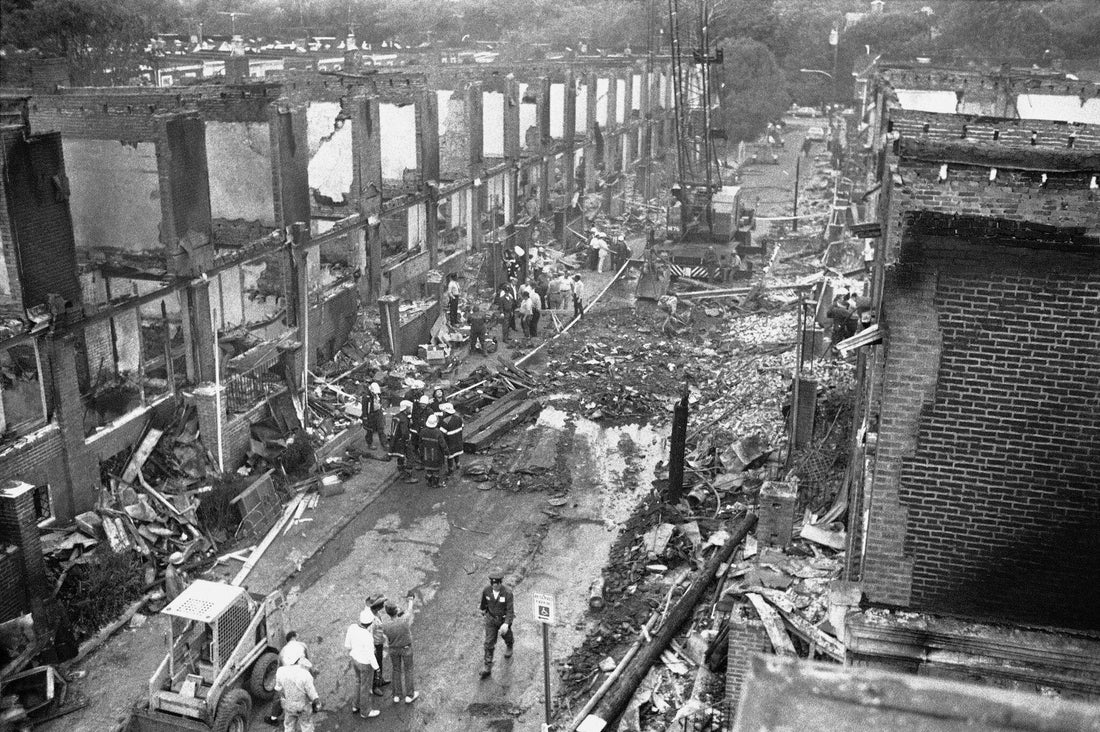
The MOVE Bombing: A Tragic Chapter in American History
Share
The MOVE bombing remains one of the most harrowing and controversial incidents in modern U.S. history. On May 13, 1985, the city of Philadelphia launched an aerial assault on a residential neighborhood, targeting the MOVE organization—a Black liberation group advocating for environmental justice, animal rights, and communal living. This act of aggression left 11 people dead, including five children, and destroyed an entire city block. The event not only highlights the extreme measures of law enforcement but also raises lasting questions about systemic racism, police brutality, and government accountability.
Who Was MOVE?
Founded in the 1970s by John Africa, MOVE was a revolutionary group based in Philadelphia. Its members, who adopted the surname "Africa," rejected modern industrial society, living communally and promoting a back-to-nature lifestyle. MOVE often clashed with city officials and law enforcement due to their confrontational approach and outspoken criticism of systemic oppression.
MOVE's activism, combined with their radical views and unconventional way of life, made them targets of police surveillance and hostility. Tensions culminated in a deadly standoff in 1978, during which one police officer died, and nine MOVE members were convicted in connection with the incident. By 1985, the group's fortified house at 6221 Osage Avenue had become the focal point of escalating conflict.
The Bombing
On May 13, 1985, after neighbors complained of MOVE’s loudspeakers broadcasting political messages, the city sought to evict the group. Law enforcement, led by then-Mayor Wilson Goode, a Black man, and Police Commissioner Gregore Sambor, arrived with a massive show of force. Nearly 500 police officers surrounded the house, attempting to evict MOVE members with tear gas and water cannons. MOVE responded with gunfire.
The police escalated their tactics, using explosives to try to breach the house. When these efforts failed, a state police helicopter dropped a bomb made of C-4 and Tovex—a military-grade explosive—onto the house. The resulting fire engulfed the building and spread across the neighborhood, ultimately destroying 61 homes.
Firefighters, under orders from police, allowed the blaze to burn for hours. The inferno killed 11 MOVE members, including founder John Africa and five children, while leaving over 250 residents homeless.
Aftermath and Accountability
The MOVE bombing shocked the nation and the world, sparking outrage and protests. Many questioned how a predominantly Black neighborhood became the site of such extreme force. A commission established to investigate the incident deemed the bombing "reckless," but no city officials faced criminal charges. The city of Philadelphia later issued financial settlements to some victims of the bombing but stopped short of admitting wrongdoing.
The scars of the bombing remain visible—both physically, as the rebuilt homes on Osage Avenue faced structural and financial issues, and emotionally, as survivors and descendants continue to demand justice.
Legacy and Lessons
The MOVE bombing underscores systemic issues of racial injustice, over-policing, and the dehumanization of Black communities. It also serves as a grim reminder of the potential for state violence against dissenting voices.
In recent years, the bombing has gained renewed attention as part of broader conversations about police brutality and systemic racism in America. Documentaries, books, and public commemorations continue to shed light on the tragedy, ensuring its lessons are not forgotten.
The MOVE bombing remains a stain on American history—a stark example of government overreach with devastating consequences. Remembering and understanding this event is vital in the ongoing struggle for justice, accountability, and equity.
Click the links below for more resources:
The 1985 MOVE Massacre: When Cops Bombed Philadelphia (Injustice Documentary)
https://www.youtube.com/watch?v=n9IHYZYc_38
The Day Philadelphia Bombed It's Own People
https://www.vox.com/the-highlight/2019/8/8/20747198/philadelphia-bombing-1985-move
